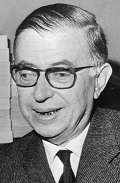Camus vs. Sartre
entre la llibertat i la justícia
Gelonch Viladegut, Antoni
Between the end of World War II and the 1960s, Europe experienced intense controversy between two lighthouses of Parisian intellectuals, Albert Camus and Jean-Paul Sartre, both of whom were awarded the Nobel Prize for Literature. Although at first they were good friends (although they started from different childhood and youth experiences), they gradually distanced themselves and their differences caused the relationship to go through some turbulence that marked them deeply. Camus' untimely death meant that reconciliation could not even begin to be seen. Their positions on totalitarianism (especially communism), the Resistance, the Algerian war or the use of the nuclear weapon increasingly separated them. But the fundamental question has always been whether justice or freedom should be given priority, and whether the end always justifies the means. The debate took place in Europe at the time and we are still trying to find an answer today. However, in our country, we have preferred not to pose the dilemma and have pretended not to exist. But ignoring it does not mean that it is not there, so that in everything we do, in the end, there is a choice, consciously or unconsciously, that proves Camus or Sartre right.
- Author
-
Gelonch Viladegut, Antoni
- Subject
-
Human sciences
> Philosophy
- EAN
-
9788418908446
- ISBN
-
978-84-18908-44-6
- Edition
- 1
- Publisher
-
Viena Edicions
- Pages
- 368
- High
- 23.3 cm
- Weight
- 15.3 cm
- Release date
- 24-03-2022
- Language
- Catalan
- Series
- Viena assaig
- Number
- 17







